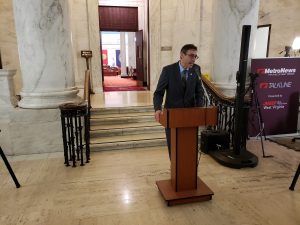CHARLESTON — The Senate passed along party lines on Thursday a water quality rule that has been the subject of a months-long tug of war between environmental and business interests.

Judiciary chair Charles Trump, R-Morgan, opened his explanation of the rule and his action on it by saying, “I think I’ve succeeded in making absolutely everyone unhappy.”
Agency rules are how they carry out their duties dictated in state code. They’re typically eye-glazing things that don’t draw much press or attention. But this one drew a couple dozen people to a rally before the floor session – some of them wearing green or blue T-shirts proclaiming them a “rogue environmentalist.”

The rule is included in SB 163, a rules bundle containing eight separate rules bills. It deals with Department of Environmental Protection human health standards for wastewater permits and pollutants – some of them carcinogenic – in wastewater discharge. The U.S. EPA recommends levels for 93 contaminants, but doesn’t mandate states follow those recommendations.
West Virginia, as with most states, doesn’t regulate all 93. In July, following its triennial review, it proposed a rule adopting EPA recommendations for 60 of the pollutants. Not all of the new standards were stricter than the previous, some allowed higher levels of the particular chemical or compound.
In November, the interim Rule Making Review Committee, at the behest of industry, asked DEP to withdraw its recommendation and retain the standards EPA set in the mid-1980s.
In late January, the Senate Energy, Industry and Mining Committee restored the 60 parameters to the rule. DEP told members at the meeting that it stood by the updated science and new standards issued by the EPA in 2015. It had complied with the Rule Making committee’s request not because it wanted to but because the committee asked it to.
Then, last week, Judiciary took the 60 parameters back out. As Trump explained on the House floor, industrial interests wanted more time to study the standards and develop more state- and site-specific measures for some of the 60.
So he changed the bill to require all stakeholders until Oct. 1, 2019, to submit comments and recommendations to the DEP; DEP then has until April 1, 2020, to re-submit its proposed standards for the 60 contaminants.
Noting the tension between the opposing interests, Trump said 14 months isn’t enough for industry but far too long for the environmental lobby, which points out industry has had since 2015 to figure this out.
Splitting the difference, he said, “I do think it’s the right thing to do. … It’s more important to be correct than to be immediate.”
But he won’t be open to further lobbying, he said. “I will be inflexible on future extensions.”
As it happened, Thursday was the annual E-Day at the legislature and the West Virginia Environmental Council led a brief rally before the floor session regarding SB 163.
The council’s Karan Ireland told the couple dozen people gathered in front of the Senate chamber, “Industry sets up a false dichotomy. You can either care about jobs and development or you can care for the environment. That’s not true.
“You can either care about economic development or you can care about clean water. That’s not true. You can care about both.”
Angie Rosser, executive director of the West Virginia Rivers Coalition, said, “We have better science now and it’s time for this Legislature to update that in the interest of protecting our health. … We want jobs here but we want companies who take care of us, who are willing to do what it takes to keep our water clean, to keep our people healthy.”
Delegate Evan Hansen, D-Monongalia and a principal in water quality consulting firm Downstream Strategies, read a sentence from a bipartisan resolution he’ll be introducing. And short environmental bill of rights, It says, in part, “The people have a right to clean air, pure water and to the preservation of the natural, scenic, historic and aesthetic values of the environment.”
West Virginia Manufacturers Association President Rebecca McPhail commented on the bill’s passage in an email exchange. “We think the action of the Senate today on SB 163 is the right thing to do. The language in the bill allows more time for the WVMA to do the work we’ve asked to be allowed to do, and we are already working to honor that pledge.
As Trump pointed out on the Senate floor, she said, “West Virginia is not alone in giving due consideration to the criteria beyond this year.” Kentucky, Tennessee, North Carolina, South Carolina, and Georgia are all deferring adoption of the 2015 criteria during their current triennial reviews.
“Furthermore, of the few states who have adopted updated criteria, many do not apply them in the same way as West Virginia,” she said. “We have been told that Texas adopted new human health criteria that it recalculated based on state values, not the EPA default numbers.”
McPhail also noted that many states don’t apply these human health criteria to dischargers who don’t impact a public water supply. “In West Virginia, we treat every discharger as if it is discharging into a drinking water supply, even though it is not. If as in many states, these proposed human health criteria did not apply to our dischargers, then our manufacturers, municipalities and miners might not be as concerned about them.”
SB 163 passed the Senate 20-12, with one Democrat joining the majority. It now heads to the House.
TWITTER @dbeardtdp Email David Beard at dbeard@dominionpost.com




